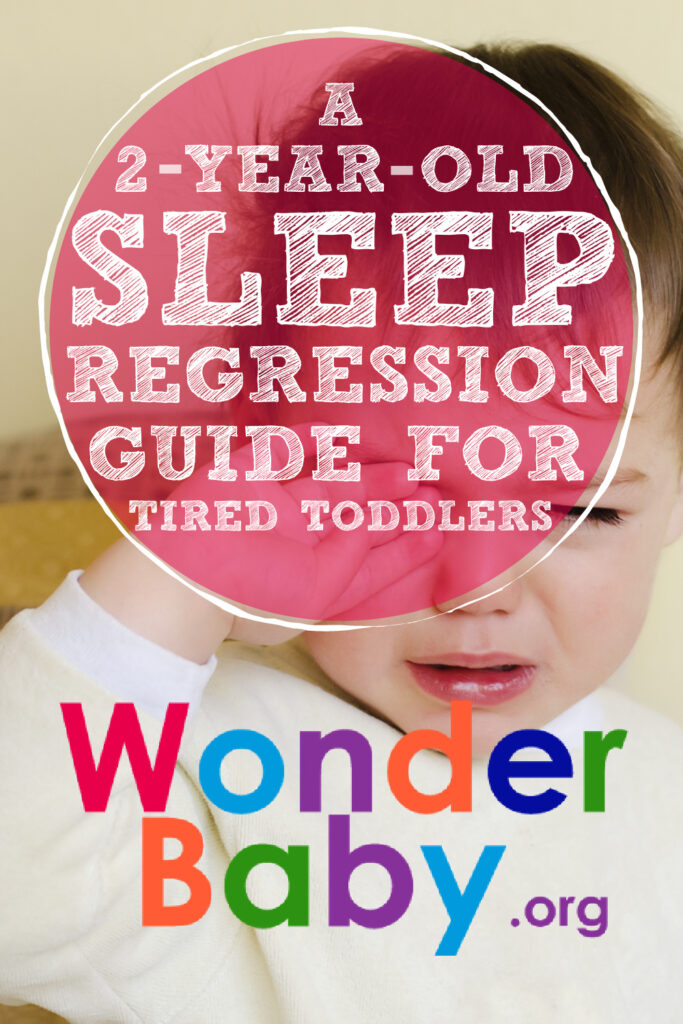A 2-Year-Old Sleep Regression Guide for Tired Toddlers

- The 2-year-old sleep regression can occur despite your child previously sleeping well.
- It may occur because of teething, developmental milestones, separation anxiety, or your child is overly tired.
- Sleep regression will only last a few weeks as your child adjusts to their new routine.
- During the sleep regression, stick to a bedtime routine to avoid overstimulation or your child avoiding going to sleep.
I remember distinctly when my kids went from sound sleepers to middle-of-the-night wakers, which conveniently happened around their second birthday. At this point, you’ve likely experienced previous sleep regressions, but it doesn’t discount the lack of sleep you are getting.
The 2-year-old sleep regression isn’t just common, it’s normal for many toddlers, despite the inconvenience it causes parents. Toddlers are busy kids, and it seems unfathomable they wouldn’t get a decent night’s sleep—but it’s not their fault their brains are working overtime.
2-Year-Old Sleep Regression: What Parents Should Know
The 2-year-old sleep regression occurs when your toddler has disruptions to their sleep, regardless if it’s naptime or the middle of the night. Your toddler may fall asleep after their normal bedtime routine, but you find them waking up in the wee hours of the night.
Unfortunately, the 2-year-old sleep regression can come out of nowhere, even after you’ve established regular sleep habits. If you’ve reached this stage of parenting, you’ve likely gone through other sleep regressions like the 6 month sleep regression, so you know it doesn’t last forever.
The 2-year-old sleep regression can occur anytime between your child’s 2nd and 3rd birthday, so remember it can pop up at any time.
Children this age have vital sleep needs, and according to the Centers for Disease Control and Prevention (CDC), toddlers should get between 11-14 hours of sleep daily, including naps.
If your child is experiencing sleep regression, you should look at how much sleep they are getting to ensure it’s enough.

What Causes the 2-Year-Old Sleep Regression?
Most causes behind the 2-year-old sleep regression are due to developmental milestones and will run their course. However, sometimes there are underlying issues you should address to ensure you end any sleep disruptions.
Sleep regressions vary from one child to the next, as there is no one size fits all. While most regressions pass on their own, if you can address the specific issue, you could be closer to restful nights.
Here is an overview of why your 2-year-old may be experiencing sleep regression and waking overnight.
Teething
Teething is no joke, and it’s no surprise it causes most toddlers to wake up in the middle of the night. You might fall asleep in your child’s room because you just want them to fall asleep while teething.
Helping a teething baby sleep might seem like a pipe dream, but sticking to a bedtime routine will help you and your child get through this rough transition.
Separation Anxiety
Parents love the cuddles from their children but prefer they aren’t in the middle of the night. If your toddler is experiencing separation anxiety, they are more likely to have a disruption to their sleep routine.
Separation anxiety might be new for your child if you recently moved or had another significant life change. Your child might not get enough sleep because they want to ensure you are staying in the same room as them.
Separation anxiety in toddlers at night shouldn’t last more than a few weeks, so it’s best to stick to your regular bedtime routines to avoid creating habits you don’t want to keep, like sharing a room.
Developmental Milestones
Two-year-olds are at an ever-growing age, and it’s the prime time for major milestones that are aiding in their growth.
When your child is developing new milestones, like learning new skills or adding words to their vocabulary, their brain goes into overdrive. For example, if your child is working on jumping or climbing, they might find the middle of the night an excellent time to practice.
Night wakings are common amongst most kids who are going through a toddler growth spurt, and you’ll find their sleep cycle is out of sync.
Your Child is Overly Tired
An overtired child does not mean they will automatically sleep soundly. On the contrary, children who are overly tired are more likely to wake up in the middle of the night and experience sleep problems.
If you put your child to bed early, they are more likely to sleep better. If your child is tired, you shouldn’t postpone bedtime in hopes of them sleeping longer.
New Baby in the House
A new bundle is exciting, but it can also cause sleep issues in your toddler. Sleep regressions after a new sibling are common because it’s a big life event. Toddler sleep can be finicky, so if you add anything new to the mix, like a new baby, don’t be surprised if your child is resisting bedtime.
Your 2-year-old might develop jealousy if they see the baby sleeps in your room while they have to sleep in their own bedroom.
Resist letting your toddler sleep in your room if it isn’t something you want to have as a permanent situation.
Your Child is Potty Training
Parents can’t wait until their child is out of diapers—but when did potty training equate to a toddler sleep regression? If your toddler is newly potty trained, don’t be surprised if they wake up in the middle of the night to use the bathroom.
You can put a potty in their room next to a night light to help promote going to the bathroom independently.
While it might interrupt their overnight sleep, the more they practice going on their own, the less disruptive it will be overall.
Changes to Nap Time
If your child normally went down fine at nap time and is starting to fight it, they might be getting close to dropping their nap. If bedtime has become difficult, it could result from their daytime sleep or lack thereof.
It’s best to aim for 5 or 6 hours of awake time between naps, which will help bedtime run smoother. However, you don’t want to make significant changes to your child’s nap at once, and instead, ease them into a new schedule.
If your child attends nursery school, you should ask their teachers if your child is still napping or fighting sleep there too.
How to Tell if Your 2-Year-Old Is Having Sleep Regression

It can be tricky to determine whether your 2-year-old is having a sleep regression or just a bad night’s sleep, but there are things to look for.
Here’s a look at the telling signs of the 2-year-old sleep regression:
- Falling asleep takes longer, and they fight sleep when they typically go without an issue.
- Your toddler is experiencing early morning waking and poor sleep in general.
- Nap time is not what it used to be, and your child refuses to take their daytime nap. You might also notice they are fighting naps or want to skip their nap altogether.
- You’ve noticed more night waking, their nighttime sleep is disrupted by multiple wake-ups, and they are tired during awake time.
- Your child’s sleep is delayed by them asking for extra stories or one more snack.
- Your toddler doesn’t want to miss out on what’s going on while they are sleeping. For example, if you have older children, your little one is more aware that they get to stay up.
Sometimes, the signs are subtle, so your toddler might go through a sleep regression, and you may assume they are sick or out of sorts.
How Long Does the 2-Year-Old Sleep Regression Last?
The question on every parent’s mind is, “how long will the 2-year-old sleep regression last?” It’s good to know that it’s just a phase, and your toddler will return to their regular routine within a few weeks.
Sleep regressions may seem endless, but there are signs it’s ending:
- The number of middle-of-the-night wake-ups is reducing, and your child is rested at wake time.
- You notice your child is on the other side of a growth spurt. Parents can often tell when their child recently grew, which can often cause a disruption at night.
- Your child isn’t fighting bed or coming up with excuses on why they aren’t tired.
Remember, all children are different, and the end of the 2-year-old sleep regression may come quickly for some, while others have a significant change in behavior.
What to Do if Your 2-Year-Old Child Is Having A Sleep Regression
If your 2-year-old child is having a sleep regression, you should stay calm and remember this is just a phase. While it’s easier said than done, it’s an aspect of parenting you likely can’t avoid. Parenting has stressful moments, and your toddler’s sleep might rank high on your list.
One of the biggest pieces of advice is to not create any habits during the regression that you won’t want to keep. Remember, this is a temporary situation, and you will get through it.
However, there are a few suggestions on getting through the 2-year-old sleep regression with a sliver of your sanity:
- Talk to a sleep consultant who can help offer tips and tricks on getting your child on a good bedtime routine to prevent sleep disruptions. A sleep consultant can also help with sleep training a toddler if they are fighting bedtime and you want them to fall asleep independently.
- Establish quality sleep habits, including an earlier bedtime to avoid early morning wake-ups. Contrary to popular belief, putting your child to sleep later does not equal a later wake-up time.
- Keep a nightly routine to prepare your child for sleep. For example, brushing teeth and reading a book are excellent ways to prepare your child for bed.
- Avoid overstimulating your child before bedtime starts, which includes turning the TV off. Children’s Primary Care recommends turning the television off at least one hour before bedtime, and they don’t suggest keeping a TV in your child’s bedroom.
- Keep sugary foods and drinks to a minimum, especially in the evening when it’s harder to settle down.
- Remind your child that sleep time is when they should be settling down and not jumping around their bedroom.
- You might be tempted to start co-sleeping, but if you don’t plan on continuing with it when the regression ends, it’s not recommended. You’ll start a new bedtime habit that will become difficult to break.
FAQs
Do all babies have a sleep regression at 2 years old?
Not all babies experience sleep regression at 2 years old, but that doesn’t mean they aren’t going through the same developmental milestones as other children their age.
Is it normal for a baby to never have sleep regressions?
Just as it’s normal for babies to have sleep regressions, it’s also normal for them to skip over the regression completely. While not everyone is lucky enough to miss a sleep regression, it can happen to some fortunate parents and babies.

Related Posts

Sleep, Special Needs
Safe Place Bedding Travel Bed Review
Traveling with a special needs child can be stressful! Having a safe, durable, and easy to use travel bed can make traveling so much easier!

Sleep, Special Needs
Sleep Regimen for Premature Babies: Special Considerations
It can take premature babies much longer than their full-term peers to sleep for long stretches. A preemie sleep schedule may encourage better sleep.

Sleep
Mastering the Bedtime Routine: 3 Tips for a Peaceful Night’s Sleep
From around six weeks, a newborn bedtime routine can help your baby learn the difference between day and night and prepare for a restful night’s sleep.